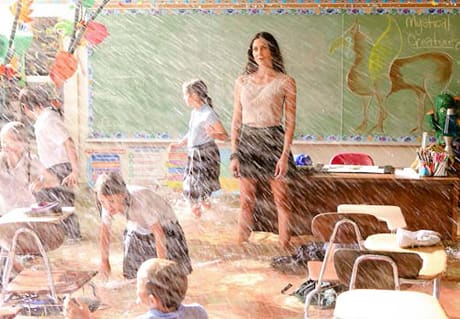Much like its central protagonist, Yellow is a messy, manic movie that's sometimes endearing and sometimes frustrating. With the occasional profanity-laden musical number and delusional sequence of dinner party guests turning into farm animals, Nick Cassavetes' latest female-centric character drama is an elaborate departure of form, gradually revealing the life history of emotionally numb substitute high school teacher Mary (Heather Wahlquist), with a risky expressionist style.
Initially appearing normal enough, save conversations with her psychiatrist (David Morse) about the inability to feel and her regular intake of prescription drugs, Mary treats her grade two students well while taking flack from her fellow teachers, which inspires the first musical number about condescension. But from the moment this song breaks the normalcy of the narrative things spin increasingly out of control, with Mary sneaking away from class to pop pills in her car, later screwing a student's father in the janitor's closet on parent-teacher night.
Easily the most inspired and riotously entertaining section of the film comes after Mary is fired from her job and receives a lecture from her Tourette's-afflicted sister, Xanne (Sienna Miller), which devolves into a public verbal argument with a bitchy waiter and an eventual physical brawl in the middle of a suburban side street.
It's ballsy, unashamed sequences of pure insanity like this that make this exceedingly observant and emotionally chaotic character analysis memorable despite its many shortcomings. Yes, the constant delusions and eventual distorted narrative, where we're never sure who or what is real, create some connectivity and tonal issues in the third act when a history of incest is revealed, but Cassavetes' wild and unfiltered vision of mental illness personified is nothing if not unique.
There's something thrilling about watching someone take risks with familiar material, going so far as to stop the film at one point and have characters discuss making themselves more likable for the audience.
(Medient)Initially appearing normal enough, save conversations with her psychiatrist (David Morse) about the inability to feel and her regular intake of prescription drugs, Mary treats her grade two students well while taking flack from her fellow teachers, which inspires the first musical number about condescension. But from the moment this song breaks the normalcy of the narrative things spin increasingly out of control, with Mary sneaking away from class to pop pills in her car, later screwing a student's father in the janitor's closet on parent-teacher night.
Easily the most inspired and riotously entertaining section of the film comes after Mary is fired from her job and receives a lecture from her Tourette's-afflicted sister, Xanne (Sienna Miller), which devolves into a public verbal argument with a bitchy waiter and an eventual physical brawl in the middle of a suburban side street.
It's ballsy, unashamed sequences of pure insanity like this that make this exceedingly observant and emotionally chaotic character analysis memorable despite its many shortcomings. Yes, the constant delusions and eventual distorted narrative, where we're never sure who or what is real, create some connectivity and tonal issues in the third act when a history of incest is revealed, but Cassavetes' wild and unfiltered vision of mental illness personified is nothing if not unique.
There's something thrilling about watching someone take risks with familiar material, going so far as to stop the film at one point and have characters discuss making themselves more likable for the audience.
